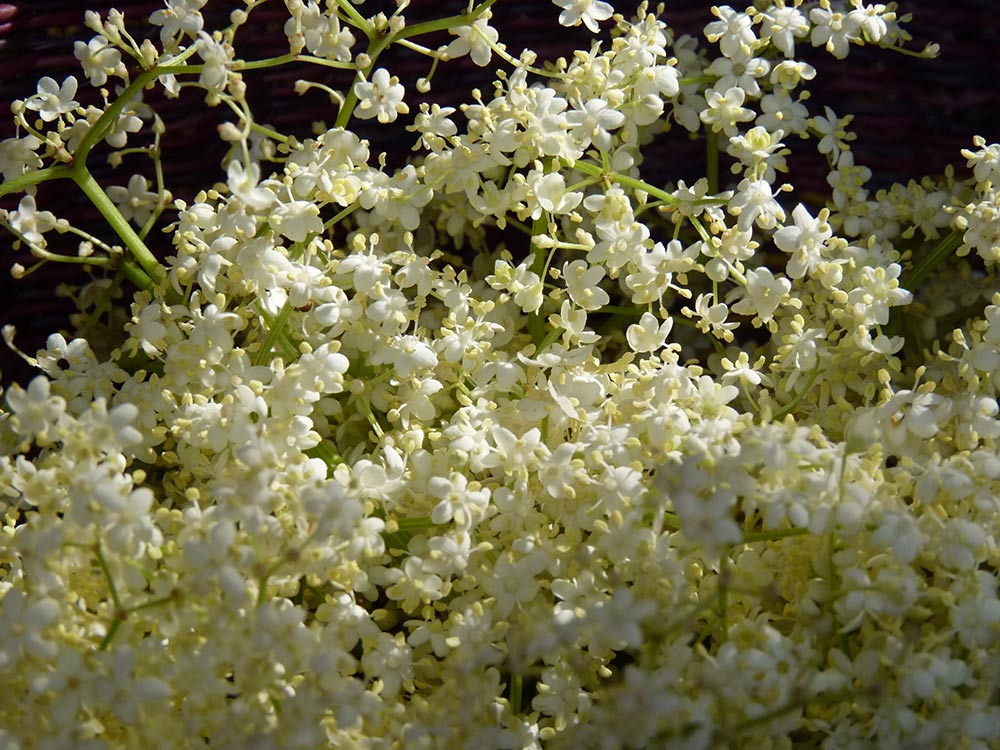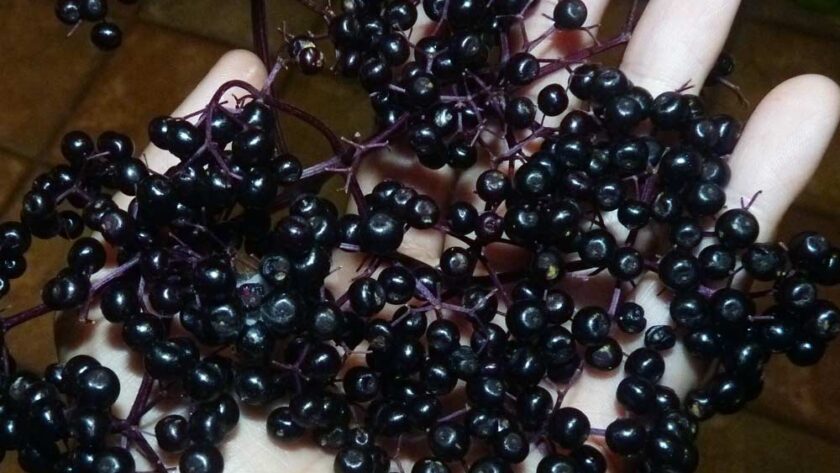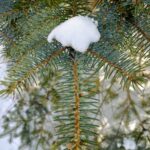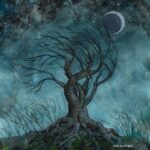
Over the summer, I spent the weekend at a beautiful farm with my family for a family reunion. That land had gifted me, and all of us, much that weekend. I had found some stunning new stones for pigments, I had spent a tranquil time on the lake, and I had talked with many of the trees there. So, as I was preparing to leave, I walked up to a giant oak on my way out. I gave it a big hug. It had rained the night before and the trunk was covered in lichen. I took a breath and the smell was that sweet and earthy smell of lichen. I remember the smell the first time I smelled such a lichen. It was down in Louisiana, and I had visited an ancient live oak with some druid friends. A branch had fallen on the ground. My friend picked it up and she handed it to me and she said, you really should smell it. And I did. It had this sweetness. The smell isn’t something that you can put into words. It simply smells amazing. Slightly sweet, slightly earthy, very serene. It smells like nothing else in the world. To this day, I feel like that lichen smell connects me to the wisdom of the ancient druids.
I am also reminded of this powerful connection right now, as the maple leaves are turning to fire and falling gently to the earth. Those leaves carry the scent of memories past, so many moments over time. Moments of jumping and burying myself in leaves, of chestnuts roasting, of raking leaves and preparing garden beds. The smell of the last of summer leaving as winter creeps ever closer. The smell of the Fall Equinox making way to Samhain. It’s just a smell that is magic, connecting me deeply with one of my favorite times–and trees–upon the landscape.
When we’re thinking about connecting with nature with the senses, usually, our sight dominates. We’re looking for things. We’re observing. We are experiencing the world through its beauty and vision. I wrote about nature observation in a few ways earlier on this blog. But, most of my previous posts have been focused on sight-based observation, and thus, perhaps the other senses are neglected. We spend a lot of time in our heads, almost in a disembodied state where our eyes put input directly to our brains (often from screens, etc). When we breathe, we fill our lungs, which brings oxygen to our entire body. We breathe into our heart spaces, allowing ourselves to be embodied and have more embodied experiences. This allows us to experience the magic of nature, the enchantment of it, in a multitude of ways. Thus, the lichen and leaf experiences are powerful reminders about nature and the senses–and the importance of attending to our many senses if we want to fully connect and commune with nature.
Smell and the Gateway to Memory

Smell is a gateway to memory. One of my earliest memories of any smell was spending time covered in leaves with my dad. My Dad and I would go out, we would rake up the beautiful sugar maple leaves, and after amassing a large pile, we would jump in them. Once we had finished jumping, we’d cover ourselves up in them, just laying there, laughing, and letting the smell of them permeate us. Sugar maple leaves have a beautiful smell in the fall. Again, I cannot put it into words, yet it is one of my favorite smells in the world. In the fall, each year I not only walk in the woods, but I rake up the leaves and jump in them because I want to experience that smell and that smell carries me back to an earlier time–a trigger for memory.
Three Deep Breaths
Smell is powerful; it is connected to our in-breath, into things coming into us, filling our lungs, engaging with our senses. Why does a forest smell so much better than a factory? Its the smell of life, of earth, of nature. When you go into a natural place, far from pollution and industrialization, you might begin by taking three deep breaths. We do this at the beginning of all OBOD rituals. Take three deep breaths together with the earth beneath us; together with the sky above us; together with the waters, lakes, and rivers around us. And as we take those three deep breaths, we are rooted in our sense of smell in that place.

As I was working on this post, I stuck my nose deep in a yarrow plant, blooming for the last time this season before the final frost kills it till next year. I know what Yarrow looks like. I know what Yarrow tastes like fresh, in tincture, and in tea. I know what her crushed leaves, often used for medicine, smell like. I know even what burning Yarrow smells like in a smudge stick. But yesterday, I closed my eyes and inhaled deeply into the last yarrow bloom of the season. I was actually quite surprised: her flower is a bit dank and skunky. I learned something new about yarrow and deepened my connection with her in a powerful way through that experience.
Smell and Nature Connection
All forests smell different in each season. Breathe deeply. Spend time in silent communion with them as you breathe out the building blocks of their life–carbon dioxide–and you breathe in their gift of oxygen and sweetness. Animals, too, have their own smells–and this is part of how we connect with them.
But so many other things can also benefit from this expanded sensory experience. What does the stone smell like? What does the water smell like? What does the dew in the grass smell like? These things are important, that they’re meaningful, they’re powerful. They give us a sense of rootedness and connectedness that comes through our very breath. The only thing I suggest you don’t sniff while out and about are white umboled flowers, particularly, the poison or water hemlock. My herbalism teacher, Jim McDonald, used to have people engage fully with the poison hemlock: touching it, smelling it (not tasting it). It’s important to learn about plants through the senses. But he told us he no longer does that because even smelling such a poisonous plant made one of his students sick and very woozy. The other thing you might want to refrain from smelling is mushrooms, particularly if they are in the spore-producing stage.
Nature connection doesn’t have to just be outdoors–you can cultivate this within your indoor spaces as well. One of my favorite indoor potted plants is my lemon-scented geranium. She lives in my art studio, now taking up about 2/3 of the available window space, crawling up along the windowsills and up each window, expanding outward. I saved her from a dumpster about 7 years ago, when I found her at the bottom of a bag of leaves. I potted her and we’ve been friends since. Her permanent residence in my art studio. She has her own smell that is entirely unique: sweet, lemony, relaxing. I often take a leaf of hers with me when I go to campus, pulling it out of my pocket to breathe deeply for a moment. Sometimes, when I’m making little cakes, I put some of her leaves on the bottom and the smell infuses into every bite. Ours is a relationship built entirely on her incredible smell!
A Journey of the Senses
If you want to go on this journey of the senses, you might start by attending to your breath. Go to a wild and fragrant place. Sit, close your eyes, and simply breathe. Our eyes dominate our senses when they are open, so its best to close them. Then, focus on your breath–what you smell, how the air feels as it enters your lungs, how it feels as it exits. Spend some time with this experience. I suggest going into mature wild spaces where you live (for me, those would be Oak-Hickory or Eastern Hemlock forests–all with their own smell). See if you can identify places not only by their look but by their smell. The oak-hickory forest has a very different smell than a Hemlock forest. Hemlock forest smells different in each season.

Another approach is to work with specific plants and take them in as a kind of aromatherapy. As a second smell exercise, when it was still high summer, I went to the blooming elder and I bent towards one of the stalks and I breathed in. I did a four-fold breath pattern (where you breath in for four counts, hold lightly for four counts, breathe out for four counts, and pause for four counts). I did this for a while. Now, the energy of the elder is with me, she is my medicine, coming through my very lungs and into my being. And that that’s powerful and meaningful–something I have carried with me even into the dark half of the year.
I think that all of these kinds of things can really help us better experience the living earth. As we work to embed ourselves in the landscape, to connect and reconnect with nature, there is wisdom that can only come from experience. It’s not the wisdom of, if not the wisdom of book knowledge, it’s not the wisdom of other people telling you things. Most of the most important profound wisdom is the wisdom that you yourself have and you gathered through your own senses. It is the wisdom that comes from realizing the world is an enchanted place, a place for all of our senses.



I wholeheartedly agree. The smells of oak – hickory forest are a daily experience, living as I do surrounded by trees. Petrichor after a shower, acorns warming in the sun, damp leaf mold, the list goes on.
Yet if I walk to the mailbox it is often Eastern Red Cedar and fescue that dominate the scent scape.
It is truly amazing what we can learn or understand if we just follow our noses.
And how each of those smells has their own rooteness in both place and in the wheel of the year. Right now, my yard is full of maple leaves that have been dropping….the smell is amazing. By next week though, the smell of the maples will be gone and new smells will arise as the wheel continues to turn.
Reblogged this on Paths I Walk.
Reblogged this on Good Witches Homestead.
I am trying to follow your blog and WordPress said I have to use a valid email. Well, I was. lol
Any ideas to help me? Thanks
Patti
hmm…i have no idea! WordPress is its own program. Maybe try again or try a different one?
Reblogged this on Blue Dragon Journal.
Thank you so much for this beautifull text. There is so much to learn from the sense of smell. It is a gateway to such great magic!
Thanks for reading and commenting, France! Magic indeed :).
Thank you for this. What a wonderful journey and lesson we can use daily.
Patti
You ae most welcome, Patti! Thanks for reading and following the blog 🙂
[…] via A Journey through the Senses: Breathe Deeply — The Druid’s Garden […]
Too often we take our sense of smell for granted. We’re aware that as we age, we might not see or hear as well, but smell? Not so much. Until something happens and it’s gone. This happened to me over the course of several months last fall through late spring. As a gardener, herbalist, and maker of botanical perfumes, I was devastated and didn’t know how I would go on. Smell is so very important, and when I lost it I felt isolated and depressed. Luckily the cause was nasal polyps, that are, for now, under control. So I can revel in the smells all around me, and take joy in making fragrances.
The memory connection is something we’re all aware of but when you don’t have it, that’s when you understand how important these types of memories are. It’s so different to smell something and have the memories flood my consciousness, rather than using my rational, thinking brain to remember. It’s like the difference between color and black and white. The waft of a fragrance sweeps us away in such a different and organic fashion than mindfully thinking of something in the past. I’m not sure if I’m communicating this accurately, but when I couldn’t smell, I got none of that and over time I felt less whole, less myself. I didn’t lose my memories, of course, but without smell bringing this or that into my present moment, everything was more linear, and for me given how important fragrance is, there was less magic in my life.
Susan, thanks for sharing this story! I understand what you mean! Over the summer, my partener and I took a trip to Iceland at the summer solstice. It was light 24 hours a day. At first it was cool, novel even, and we enjoyed being out all hours of the night. But by about day 4 or day 5, we were getting a little delirious; it was affecting us deeply. I will never forget that first night we returned. After long flights and a long drive, we were exhausted and turned in early. But at 4am, I woke up and simply wandered the property in the dark….taking in the night. Breathing in the stars. I hadn’t realized it, but I never knew how important the change of the day to night was to me until suddenly, it wasn’t there. Not quite the same as one of our senses, I realize, but perhaps, a similar “you don’t realize how important it is till its gone”.
Thank you for sharing this experience of yours. I compare day and night to the four seasons as well. For me it’s a natural rythym. And what a beautiful image “to breathe in the stars” when all is dark and quiet and still; when all that is heard is the scurries of itty night creatures. Thank you for this beautiful picture in my mind.
Reblogged this on dreamweaver333.
Thanks for the reblog!
I adore your teaching…a gift to the world!
Thank you! And thank you for reading 🙂